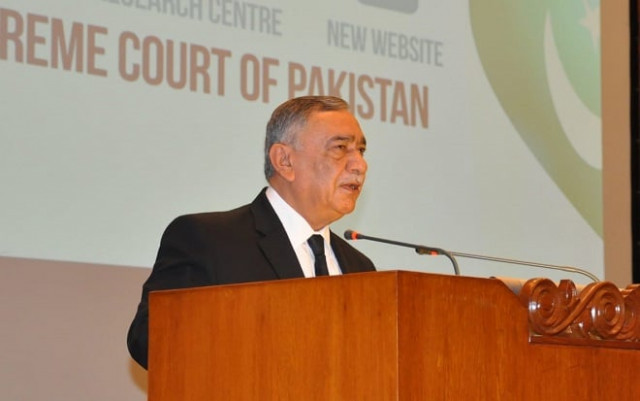Litigant-friendly: CJP inaugurates e-courts, research centre and new SC website
Asif Saeed Khosa says modern technology bringing silent revolution in judiciary

CJP Asif Saeed Khosa addresses a ceremony in Islamabad. PHOTO: EXPRESS
"Over the course of history, humans have always resisted the use of new technology and adopting modernisation...Muslims realised 150 years ago that they would be left behind if modern technology was not adopted," said the top judge while addressing a ceremony in Islamabad to introduce the litigant-friendly initiatives.
"The aim to launch a video link system and a new website of the apex court is to use modern technology in speedy disposal of cases, to enable effective decision-making and to provide convenience to the litigants," he said.
CJP Khosa maintained that the use of modern technology in the judiciary had produced effective results, adding that many witnesses had testified before the court via video call.
“ I have witnessed the proceedings of four model courts and they are bringing a silent revolution in the judiciary,” he maintained.
An official statement said the initiatives had started paying dividends by making it cost-effective both for lawyers and litigants to participate in case proceedings through their nearest registry instead of having to travel to Islamabad.
The Supreme Court IT Committee collaborated with the National Database and Registration Authority (NADRA) to establish a live video link between the principal seat and its four branch registries, the communique added.
The CJP said the research center would assist the judges during case proceedings, adding that an artificial intelligence court system was being established to provide quick access to past rulings, as well as precedents.
Modern website features and tools, the statement said, have been introduced such as an "Online Case Search" with the provision of complete history of any case of the apex court.
The top judge appreciated the role of NADRA for making the use of technology possible in the courts, and also acknowledged the assistance of American justice system.


















COMMENTS
Comments are moderated and generally will be posted if they are on-topic and not abusive.
For more information, please see our Comments FAQ